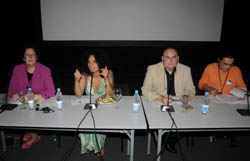"To Make Films That Transcend…The Means Justifies the End."
Santo Domingo, November 22, 2008
 |
|
Nina Streich, Raquel Cepeda, Antonio Saura, Isaac
Isitan |
Film directors Philippe Caland, Raquel Cepeda, Isaac Isitan; film producer Antonio Saura and Nina Streich, Executive Director of the Global Peace Film Festival, talked about their passion for film, their amazing experiences, the effort required to make films that express their view and contribute to change.
These well-known filmmakers whose work is seen worldwide at film festivals, met yesterday at the FUNGLODE auditorium on a panel called: "Can filmmakers contribute to change? How to make a film that transcends?" Each panelist spoke about his/her work as story tellers, revealing truths and offering possible solutions.
In the case of Raquel Cepeda, born in New York to Dominican parents, she chose to show in her documentary, "Bling: A Planet Rock" the power of hip-hop music and the singers´obsession with diamonds. She warns that her work is crude but honest, sustained by the atrocious reality that cannot be "sugar-coated." In order to show the real devastation caused by ten years of civil in Sierra Leone, West Africa, one has to shock the public. This was her job, her end and her means.
Another documentary shown at the II Dominican Global Film Festival is "The Women of Brukman," winner of the Sundance Film Festival. Directed by Isaac Isitan, a director with a enormous social commitment, says that the value of things cannot always be measured economically, "the value lies is in what we can change." Involved in social causes, he says he works, day after day, so that his films can reach as many public networks as possible.
Another point of special interest on the panel was the issue of technology in the world of film. For Philippe Caland, it is "good news" that we have made progress. He added that it is important to use technology within an ethical context; his films are characterized as transformational and instructive. Antonio Saura called this surprising, saying that technology offers many options and, in fact, has freed film from elitism and high costs.
Nina Streich used an anecdote to state clearly what she feels is the role of film in society. She is the director of the Film Festival that has shown more than 300 films about all types of social issues. At the end of each screening, a survey is given to the audience with the following question: "Did the film you just saw change your way of thinking?" And the answer has always been: "Yes."
Together or separately, they all seek the same goal: to endure and to achieve important changes in the people who seek plausible "ends" and to help out with the "means" for those who seek to make their adventure stories into a convincing reality. |








